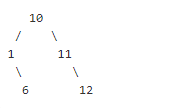lintcode-86-二叉查找树迭代器
86-二叉查找树迭代器
设计实现一个带有下列属性的二叉查找树的迭代器:
元素按照递增的顺序被访问(比如中序遍历)
next()和hasNext()的询问操作要求均摊时间复杂度是O(1)样例
对于下列二叉查找树,使用迭代器进行中序遍历的结果为 [1, 6, 10, 11, 12]
挑战
额外空间复杂度是O(h),其中h是这棵树的高度
Super Star:使用O(1)的额外空间复杂度标签
二叉树 二叉查找树 LintCode 版权所有 非递归 谷歌 领英 脸书
方法一(空间复杂度O(n),n为树的节点数):
使用数组保存树的中序遍历的结果
code
/**
* Definition of TreeNode:
* class TreeNode {
* public:
* int val;
* TreeNode *left, *right;
* TreeNode(int val) {
* this->val = val;
* this->left = this->right = NULL;
* }
* }
* Example of iterate a tree:
* BSTIterator iterator = BSTIterator(root);
* while (iterator.hasNext()) {
* TreeNode * node = iterator.next();
* do something for node
*/
class BSTIterator {
public:
vector<TreeNode *> inorder;
int current;
//@param root: The root of binary tree.
BSTIterator(TreeNode *root) {
// write your code here
inorder = inorderTraversal(root);
current = 0;
}
//@return: True if there has next node, or false
bool hasNext() {
// write your code here
if(current == inorder.size()) {
return false;
}
else {
return true;
}
}
//@return: return next node
TreeNode* next() {
// write your code here
return inorder[current++];
}
vector<TreeNode *> inorderTraversal(TreeNode *root) {
vector<TreeNode *> order;
if(root == NULL) {
return vector<TreeNode *>();
}
stack<TreeNode *> s;
TreeNode *p = root;
while(p != NULL || !s.empty()) {
while(p != NULL) {
s.push(p);
p = p->left;
}
if(!s.empty()) {
p = s.top();
order.push_back(p);
s.pop();
p = p->right;
}
}
return order;
}
};
方法二(空间复杂度O(h),h为树的高度):
参考博客http://blog.csdn.net/smile_watermelon/article/details/47280679
code
/**
* Definition of TreeNode:
* class TreeNode {
* public:
* int val;
* TreeNode *left, *right;
* TreeNode(int val) {
* this->val = val;
* this->left = this->right = NULL;
* }
* }
* Example of iterate a tree:
* BSTIterator iterator = BSTIterator(root);
* while (iterator.hasNext()) {
* TreeNode * node = iterator.next();
* do something for node
*/
class BSTIterator {
public:
stack<TreeNode *> inorder;
//@param root: The root of binary tree.
BSTIterator(TreeNode *root) {
// write your code here
putIntoStack(root);
}
//@return: True if there has next node, or false
bool hasNext() {
// write your code here
return !inorder.empty();
}
//@return: return next node
TreeNode* next() {
// write your code here
TreeNode *current = inorder.top();
TreeNode *temp = current;
inorder.pop();
putIntoStack(current->right);
return current;
}
void putIntoStack(TreeNode *root) {
TreeNode *node = root;
while(node != NULL) {
inorder.push(node);
node = node->left;
}
}
};



 浙公网安备 33010602011771号
浙公网安备 33010602011771号